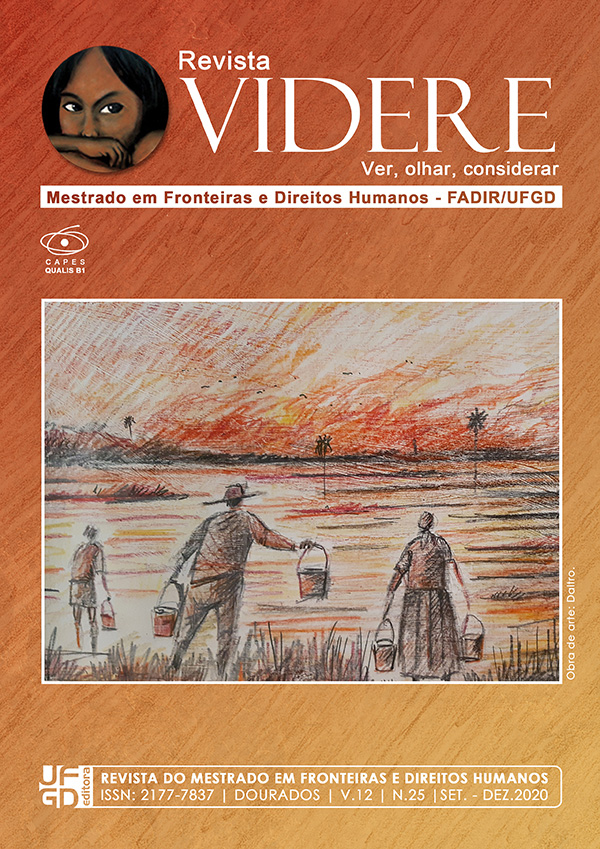Justice and equality for people with disabilities: disability as one of Rawls' frontiers of Justice
DOI:
https://doi.org/10.30612/videre.v12i25.13310Keywords:
Justice. Equality. People with Disabilities. Care. Capabilities.Abstract
People considered as non-cooperative, with abnormal functioning, that stand below a line of basic capacities have traditionally been excluded from the mantle of justice. Concerning this problem, our objective is to analyze Rawls' concept of justice with regard to the inclusion of people with disabilities, both when composing justice, in the hypothetical consensus of the original position, and when applying the rules of architected justice. We identified four cleavages in the Rawlsian theory of justice that prevent the reception of disability: the veil of ignorance combined with hypothetical equality; the normal range of capacity’s variation; the natural inequalities considered in the difference principle; and the concept of “ethical people”. In a second foray, we report the criticisms of Kittay, in the scope of the ethics of care and interdependence, and of Nussbaum, in the context of the capabilities approach. Our methodology is hypothetical-deductive, with a qualitative-descriptive approach and it is based on a bibliographic review.Downloads
References
ARISTÓTELES. Ética à Nicômaco. São Paulo. Nova Cultural: 1996.
BARBOSA-FOHRMANN, Ana Paula. Os modelos médico e social de deficiência a partir dos significados de segregação e inclusão nos discursos de Michel Foucault e de Martha Nussbaum. REI-REVISTA ESTUDOS INSTITUCIONAIS, v. 2, n. 2, p. 736-755, 2017.
BARBOSA-FOHRMANN, Ana Paula; ANGELICA, Thiago da Costa Sá. Crianças com deficiência e o acesso à educação fundamental no Brasil: inclusão ou integração? Uma análise a partir do direito constitucional. Pensar-Revista de Ciências Jurídicas, v. 19, n. 1, p. 9-34, 2014.
BOBBIO, Norberto. Igualdade e Liberdade. 2. ed. Rio de Janeiro: Ediouro, 1997.
CARLSON, Licia; KITTAY, Eva Feder. Introduction: Rethinking philosophical presumptions in light of cognitive disability. Metaphilosophy, v. 40, n. 3‐4, p. 307-330, 2009.
CUENCA, Patricia. Disability and Humans Rights: A Theoretical Analysis. The Age of Human Rights Journal, n. 4, p. 34-59, 2015.
CUENCA, Patricia. Sobre la inclusión de la discapacidad en la teoría de los derechos humanos. In: Revista de Estudios Políticos (nueva época). Madrid, n. 158, octubre-diciembre, 2012.
CUENCA, Patricia. Derechos humanos y discapacidad: de la renovación del discurso justificatorio al reconocimiento de nuevos derechos. Anuario de filosofía del derecho, n. 32, p. 53-83, 2016.
DEGENER, Theresia. Disability in a Human Rights Context. Laws. vol. 5 no. 3. 2016.
DINIZ, Débora. Quem Autoriza o Aborto Seletivo no Brasil? Médicos, Promotores e Juízes em Cena. In: PHYSIS: Rev. Saúde Coletiva, Rio de Janeiro, 13(2):13-34, 2003.
FRENCH, Sally et al. Whose Tragedy: Towards a personal non-tragedy view of disability. In: SWAIN, John. et al (eds) Disabling Barriers – Enabling Environments. 2. ed. London: Sage, 2004.
KITTAY, Eva. Love’s Labor: essays on women, equality and dependency. New York: Routledge. 1999.
KITTAY, Eva Feder. When caring is just and justice is caring: Justice and mental retardation. Public Culture, v. 13, n. 3, p. 557-579, 2001.
NUSSBAUM, Martha. The capabilities of people with cognitive disabilities. Metaphilosophy, v. 40, n. 3‐4, p. 331-351, 2009.
NUSSBAUM, Martha C. Fronteiras da justiça: deficiência, nacionalidade, pertencimento à espécie. Tradução de Susana de Castro. São Paulo: WMF Martins Fontes, 2013.
RALWS, John. Justiça como eqüidade: uma concepção política, não metafísica. Lua Nova, São Paulo, n. 25, p. 25-59, Apr. 1992.
RALWS, John. O liberalismo político. Trad. Dinah de Abreu Azevedo. 2. ed. 2. Imp. São Paulo: ed. Ática. 2000.
RALWS, John. Uma teoria de Justiça. Trad. Almiro Pisetta e Lenitta M. R. Esteves. São Paulo: Martins Fontes. 1997.
SHAKESPEARE, Tom. Disability rights and wrongs revisited. 2 ed. Londres, Nova York: Routledge. 2014.
SILVERS, Anita. Reconciling Equality To Difference: Caring (F)or Justice For People With Disabilities, Hypatia, v. 10, p. 30-55, 2009.
SILVERS, Anita; FRANCIS, Leslie Pickering. Justice through trust: Disability and the “outlier problem” in social contract theory. Ethics, v. 116, n. 1, p. 40-76, 2005.
SILVERS, Anita. Thinking about the good: Reconfiguring liberal metaphysics (or not) for people with cognitive disabilities. Metaphilosophy, v. 40, n. 3‐4, p. 475-498, 2009.
STEIN, Michael. Disability Human Rights, California Law Review, v. 95. N. 1, p. 75-121. 2007.
VITA, Álvaro de. Uma concepção liberal-igualitária de justiça distributiva. Revista Brasileira de Ciências Sociais, v. 14, n. 39, p. 41-59, 1999.
WASSERMAN, David et al. Disability and justice. In: Zalta, Edward N. et al (ed). The Stanford Encyclopedia of Philosophy. Palo Alto: Stanford University, 2013.
WONG, Sophia Isako. Duties of justice to citizens with cognitive disabilities. Metaphilosophy, v. 40, n. 3‐4, p. 382-401, 2009.
Downloads
Published
How to Cite
Issue
Section
License
Authors must accept the publication rules when submitting the journal, as well as agree to the following terms:
(a) The Editorial Board reserves the right to make changes to the Portuguese language in the originals to maintain the cultured standard of the language, while respecting the style of the authors.
(b) Authors retain the copyright and grant the journal the right to first publication, with the work simultaneously licensed under the Attribution-NonCommercial-ShareAlike 3.0 Brazil (CC BY-NC-SA 3.0 BR) that allows: Share - copy and redistribute the material in any medium or format and Adapt - remix, transform, and create from the material. CC BY-NC-SA 3.0 BR considers the following terms:
- Attribution - You must give the appropriate credit, provide a link to the license and indicate whether changes have been made. You must do so under any reasonable circumstances, but in no way that would suggest that the licensor supports you or your use.
- NonCommercial - You may not use the material for commercial purposes.
- Sharing - If you remix, transform, or create from material, you must distribute your contributions under the same license as the original.
- No additional restrictions - You may not apply legal terms or technological measures that legally restrict others from doing anything that the license permits.
(c) After publication, authors are allowed and encouraged to publish and distribute their work online - in institutional repositories, personal page, social network or other scientific dissemination sites, as long as the publication is not for commercial purposes.



















